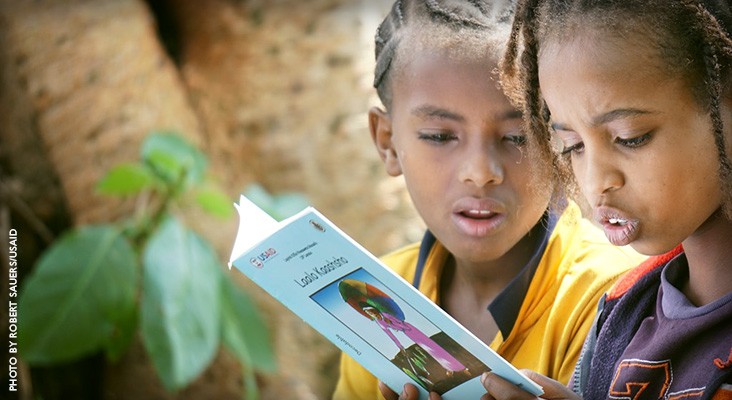Speeches Shim

Ethiopia is a diverse country with a population of 105 million people and over 90 ethnic and linguistic groups. Approximately 40 percent of Ethiopia’s population is under the age of 15, with another 30 percent between the ages of 15-29. As Ethiopia continues to develop, equipping its future working-age generation with foundational literacy skills and preparing them for employment will be fundamental to the country’s goal of becoming a middle-income country by 2025.
In the last two decades, Ethiopia has made impressive development gains in the education sector. Today, over 18 million children are enrolled at the primary level with a net enrollment rate of 100 percent. Unfortunately, the positive achievement of getting more children into school has strained the capacity of the system, and student learning has suffered. USAID’s 2018 Early Grade Reading Assessment suggests that only 40 percent of students in grades 2 and 3 can read at a satisfactory level of 20-25 words per minute. The lack of printed materials and insufficient support for teachers has resulted in many students failing to acquire basic literacy skills that would allow them to learn other subjects and advance beyond primary school. This is demonstrated by a low secondary enrollment rate of 16 percent.
Students who do not continue or complete secondary education fare worse in employability due to lack of skills, leading to an increased risk of unemployment and discontent. To date, youth underemployment, defined as involuntary part-time work or underutilization of skills, is estimated at 27 percent. Young females are twice as likely to be underemployed or unemployed as males. In addition, landlessness in rural communities have driven many young people to seek employment in urban areas, further straining resources in cities.
In partnership with the Ministry of Education and regional state education bureaus, USAID invests in Ethiopia’s children and youth to improve reading and reading skills among 15 million students in grades 1-8, and prepare young Ethiopians to lead more prosperous lives. We focus on early grade reading because literacy is at the core of developing young independent thinkers whose academic excellence will enable them to make a meaningful difference in their community and around the world. To do this, our support trains teachers to improve the quality of instruction in reading curriculum and provide early grade reading materials in seven native Ethiopian languages and English. USAID’s education activities are also inclusive and allow students with special needs to participate and learn alongside their peers.
To evaluate the impact of our interventions, we support the Ministry of Education in conducting Early Grade Reading Assessments in seven local languages and English every other year, as well as annual learning assessments. Additionally, USAID partners with the Ministry of Education to develop the ability to anticipate and rapidly respond to student, school, or household needs so children can continue their education during crises, whether it is related to drought, conflict, or global pandemics like COVID-19.
KEY ACTIVITIES
-
USAID’s Reading for Ethiopia’s Achievement Developed (READ II) project to improve the quality of literacy instruction by training teachers in reading curriculum, and by providing effective early grade reading materials in seven mother-tongue languages and English as means to improve the literacy of over 15 million children. The READ II project also partners with communities to establish reading camps outside the classroom and supports the Ministry of Education in conducting Early Grade Reading Assessments.



Comment
Make a general inquiry or suggest an improvement.